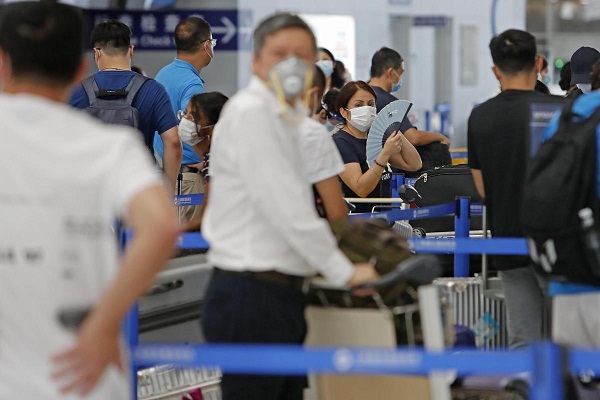Shanghai adjusts its quarantine policies

Passengers at Pudong International Airport in Shanghai, on Aug 10, 2020. [Photo/VCG]
Quarantine policies for international travelers to Shanghai with their final destination in neighboring Jiangsu, Zhejiang or Anhui provinces will undergo some adjustments starting on Sept 12, the Shanghai government's leading group for combating COVID-19 said on Sept 8.
While the total length of quarantine for inbound passengers remains 14 days, people traveling to the three neighboring provinces and testing negative after three days of quarantine in Shanghai-instead of the current seven days-will be transferred to their city of destination to finish the last 11 days of quarantine in designated places, under the new measure.
Those who show symptoms, test positive or have close contact with COVID-19 patients during their quarantine in Shanghai will remain in the city for treatment or medical observation.
The adjustment doesn't apply to people going to places other than Jiangsu, Zhejiang and Anhui provinces. They will continue their quarantine in Shanghai for the entire 14 days.
Inbound travelers whose destination is within Shanghai are still allowed to do a seven-day hotel quarantine plus a seven-day home quarantine within proper conditions. Such conditions include a fixed residence in the city, a nucleic acid test on the fifth day of a hotel quarantine with a negative result and mandatory home quarantine for those living in the same apartment.
Travelers who do not meet the conditions for home quarantine or do not want a home quarantine will do the 14-day quarantine at a hotel.
Completing 14 days of quarantine at home applies to travelers not fit for hotel quarantine, such as the elderly, minors, pregnant women, those with disabilities or those who need to care for their elderly parents or young children at home. After passing the nucleic acid test upon arrival and being reviewed to qualify for home quarantine, such travelers can apply to do the 14 days at home.
Shanghai began to adopt quarantine measures for inbound travelers on March 6. The World Health Organization declared the COVID-19 outbreak a pandemic five days later. Travelers from four countries, including hard-hit Italy and Iran, were initially subject to epidemiological checks by customs officials and 14 days' quarantine. Since March 26, all arrivals in the city have been subject to epidemiological checks and nucleic acid testing as the city launched its management efforts to prevent COVID-19 importation.
Fu Chen, director of the Shanghai Center for Disease Control and Prevention has said the city's closed-loop management consists of three loops. The first is activated upon passengers' arrival at the airport. People showing symptoms are sent by ambulance to a hospital for further examination while others are sent by specially assigned vehicles to quarantine facilities, Fu said.
The second loop refers to the enclosed transportation process, from the airports to designated quarantine locations. The last is the management of quarantine facilities, which are staffed by disease control professionals as well as medical and service personnel from local clinics and communities.
As of Thursday, Shanghai had received 587 imported cases and no local transmission had occurred since March except for one in May, a woman visiting from Wuhan, Hubei province.
 Contact Us
Contact Us

 Pudong lights up city with spectacular shows and cultural marvels
Pudong lights up city with spectacular shows and cultural marvels Brilliant light show to illuminate Huangpu River
Brilliant light show to illuminate Huangpu River Maple leaves paint splendid scenery in Pudong
Maple leaves paint splendid scenery in Pudong Appreciate alluring lotus blossoms in Pudong's Century Park
Appreciate alluring lotus blossoms in Pudong's Century Park


